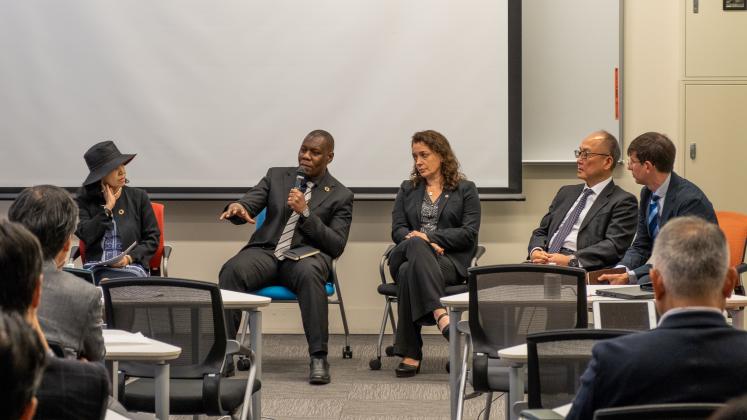On 11 November 2023, UNU-IAS organized a public event in Kanazawa, Japan, which discussed diverse approaches and initiatives for accelerating progress on the SDGs. The speakers included three members of the UNU-IAS advisory Board, who were visiting the institute’s Operating Unit Ishikawa/Kanazawa (OUIK) to learn about and support its activities.
Observing that only 15% of SDG targets were on track for 2030, Shinobu Yume Yamaguchi (Director, UNU-IAS) underlined that local action was urgently needed to reignite progress. Prof. Yamaguchi welcomed the presence of young participants in the session, and emphasized that policymakers had a responsibility to engage youth in policy formulation.
Philip Osano (Centre Director, Stockholm Environment Institute and Chair, UNU-IAS Board) discussed efforts to protect wildlife in and around Nairobi National Park, which is under pressure from construction and climate change. A Payments for Ecosystem Services (PES) scheme has provided payments to pastoral communities to keep their land open. Dr. Osano explained how this single intervention was helping to achieve several SDGs: reducing poverty (SDG 1), protecting life on land (SDG 15) and reducing inequality (SDG 10).
Focusing on universities, Melissa Brown Goodall (Deputy Director, MacMillan Center for International and Area Studies, Yale University; and UNU-IAS Board Member) emphasized that their role was to test and challenge the SDGs. She introduced an exercise conducted at Yale University and the University of Pennsylvania to map teaching and research to the SDGs, which produced a searchable database and identified gaps in the SDGs that included agriculture, mining, plastic pollution and culture. Dr. Goodall noted that the Summit for the Future in September 2024 would be an opportunity to reinvigorate action on the SDGs and consider the future of the sustainable development agenda beyond 2030.
Mitsuo Kojima (Representative Director, MetLife Asset Management Corp., Japan; and UNU-IAS Board Member) underlined that both finance and scientific advice were needed to achieve the SDGs, and recognized the contribution of UNU-IAS. Noting that Japan had issued its first green transition bonds to finance the shift to net zero emissions, he suggested that transition finance could be effective in Japan as part of stakeholder capitalism. Mr. Kojima emphasized the need for a term or concept in Japanese that could achieve broad recognition across society and catalyze action on sustainable finance.
Juan Pastor-Ivars (Research Associate, UNU-IAS) introduced the Sustainable Urban Nature project of OUIK, which is developing a sustainable model for conservation of urban green spaces that reflects links between biological and cultural diversity. Due to its natural water resources Kanazawa has rich biodiversity, and the project has provided scientific evidence of its gardens’ environmental, social and economic benefits. This was recognized in the selection of Kanazawa as a Role Model City for the UNEP Generation Restoration project in October 2023.
Discussion highlighted the importance of ambitious local initiatives that align with the global sustainable development agenda. It was emphasized that action should promote well-being, including mental health and happiness, as part of SDG 3.




